During your baby's first few weeks, you may feel overwhelmed at times. Newborn care gets easier with every day. Soon you will know what each cry means, and you'll be able to figure out what your baby needs and wants.
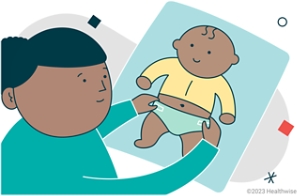
To keep the umbilical cord uncovered, fold the diaper below the cord. Or you can use special diapers for newborns that have a cutout for the cord.
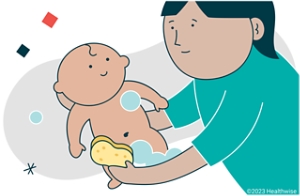
To keep the cord dry, give your baby a sponge bath instead of bathing them in a tub. The cord should fall off in a week or two.
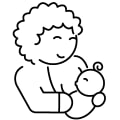
Feeding your baby
- Feed your baby whenever they're hungry. Feedings may be short at first but will get longer.
- Wake your baby to feed, if you need to.
- Breastfeed at least 8 times every 24 hours, or formula-feed at least 6 times every 24 hours.

Understanding your baby's sleeping
- Newborns sleep most of the day and wake up about every 2 to 3 hours to eat.
- While sleeping, your baby may sometimes make sounds or seem restless.
- At first, your baby may sleep through loud noises.
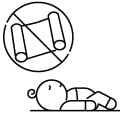
Keeping your baby safe while they sleep
- Always put your baby to sleep on their back.
- Don't put sleep positioners, bumper pads, loose bedding, or stuffed animals in the crib.
- Don't sleep with your baby. This includes in your bed or on a couch or chair.
- Have your baby sleep in the same room as you for at least the first 6 months.
- Don't place your baby in a car seat, sling, swing, bouncer, or stroller to sleep.
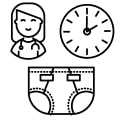
Changing your baby's diapers
- Check your baby's diaper (and change if needed) at least every 2 hours.
- Expect about 3 wet diapers a day for the first few days. Then expect 6 or more wet diapers a day.
- Keep track of your baby's wet diapers and bowel habits. Let your doctor know of any changes.

Keeping your baby healthy
- Take your baby for any tests your doctor recommends. For example, babies may need follow-up tests for jaundice before their first doctor visit.
- Go to your baby's first doctor visit. First doctor visits are usually within a week after childbirth.

Caring for yourself
- Trust yourself. If something doesn't feel right with your body, tell your doctor right away.
- Sleep when your baby sleeps, drink plenty of water, and ask for help if you need it.
- Tell your doctor if you or your partner feels sad or anxious for more than 2 weeks.
- Call your doctor or midwife with questions about breastfeeding or bottle-feeding.
Follow-up care is a key part of your child's treatment and safety. Be sure to make and go to all appointments, and call your doctor if your child is having problems. It's also a good idea to know your child's test results and keep a list of the medicines your child takes.
Where can you learn more?
Go to http://www.healthwise.net/patientEd
Enter G069 in the search box to learn more about "Your Newborn at Home: Care Instructions".
Current as of: October 24, 2024
Author: Ignite Healthwise, LLC Staff
Clinical Review Board
All Healthwise education is reviewed by a team that includes physicians, nurses, advanced practitioners, registered dieticians, and other healthcare professionals.

